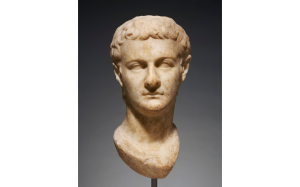Ancient Israel- From Abraham to the Roman Destruction of the Temple. Ed. Hershal Shanks. Washington, D.C.- Biblical Archaeology Society, 1999.
Riots in Alexandria
 The mad emperor Caligula and his legate in Egypt withdrew, or attempted to withdraw, these rights and privileges. Riots erupted first in Alexandria—the “Greeks” (that is, the Greek-speaking population of the city, most of whom were not “Greek” at all) against the Jews. Exactly who or what started the riots is not clear. The root cause of the conflict, however, was the ambiguous status of the city’s Jews. On the one hand, the Alexandrians resented the Jewish politeuma and regarded it as a diminution of the prestige and autonomy of their own city. On the other hand, the Jews thought that membership in their own politeuma should confer on them the same rights and privileges the citizens of the city had. The result of these conflicting claims was bloodshed and destruction. Aided by the Roman governor of Egypt, the Greeks attacked the Jews, pillaged Jewish property, desecrated or destroyed Jewish synagogues and herded the Jews into a “ghetto.” The Jews were hardly passive during these events, and resisted both militarily and diplomatically. The most distinguished Jew of the city, the philosopher Philo, led a delegation to the emperor to argue the Jewish cause.
The mad emperor Caligula and his legate in Egypt withdrew, or attempted to withdraw, these rights and privileges. Riots erupted first in Alexandria—the “Greeks” (that is, the Greek-speaking population of the city, most of whom were not “Greek” at all) against the Jews. Exactly who or what started the riots is not clear. The root cause of the conflict, however, was the ambiguous status of the city’s Jews. On the one hand, the Alexandrians resented the Jewish politeuma and regarded it as a diminution of the prestige and autonomy of their own city. On the other hand, the Jews thought that membership in their own politeuma should confer on them the same rights and privileges the citizens of the city had. The result of these conflicting claims was bloodshed and destruction. Aided by the Roman governor of Egypt, the Greeks attacked the Jews, pillaged Jewish property, desecrated or destroyed Jewish synagogues and herded the Jews into a “ghetto.” The Jews were hardly passive during these events, and resisted both militarily and diplomatically. The most distinguished Jew of the city, the philosopher Philo, led a delegation to the emperor to argue the Jewish cause.
While in Rome Philo learned of another, even more serious, assault on Judaism by the state. Angered by the Jews’ refusal to accord him divine honors, Caligula ordered the governor of Syria to erect a colossal statue of the emperor in the Temple of Jerusalem. Whether something more than coincidence ties together the anti-Jewish riots in Alexandria with Caligula’s assault on the Temple is not clear, especially because of some uncertainty in the relative chronology of the two sets of events.
In any case, the rights of the Jews of Alexandria and the sanctity of the Temple in Jerusalem were threatened simultaneously. The Roman governor of Syria, Publius Petronius, realizing that the execution of Caligula’s order to erect his statue in the Temple could not be accomplished without riots and a tremendous loss of life, procrastinated. In a letter to Caligula, Petronius explained that the matter should be delayed because otherwise it would interfere with the harvest; in a second letter, he asked the emperor to rescind his order outright.
In the meantime, Agrippa II, who was a friend of Caligula’s, convinced the emperor to rescind his demand. Caligula did so but was angered when he received Petronius’s second letter, which indicated that Petronius had no intention of following the imperial order. In reply, Caligula ordered Petronius to commit suicide. Petronius received this ultimatum, however, only after he learned that Caligula had been assassinated. This brought to an end the potential troubles in the land of Israel. The troubles in Alexandria were settled by Claudius, Caligula’s successor, who ordered both the Jews and the Greeks to return to the status quo- The Jews were to maintain their politeuma, but were not to ask for more rights than was their due.
Perhaps one of the most significant aspects of these events was the refusal of the Jews even to consider rebellion against the empire. In Alexandria, the Jews took up arms only in self-defense and only with reluctance—at least this is what Philo tells us. The Jews directed their fighting against their enemies, not against the emperor or the Roman Empire. In the land of Israel itself, when Caligula’s edict to erect a statue of himself in the Temple became known, the Jews assembled before Petronius en masse and declared that he would have to kill every one of them before they would allow the Temple to be desecrated. But the Jews did not threaten rebellion. Instead, in anticipation of Mahatma Gandhi in India in the 20th century, they offered passive resistance. Because Petronius was an ethical man with a conscience, he was convinced by these mass demonstrations not to carry out his assignment. Even a governor with less moral fiber might have been persuaded by these tactics- Pontius Pilate removed the golden shields from Jerusalem after the Jews protested, declaring that they would rather be killed than allow the images to remain in the Temple. At no point in either story do “brigands” or revolutionaries make an appearance.